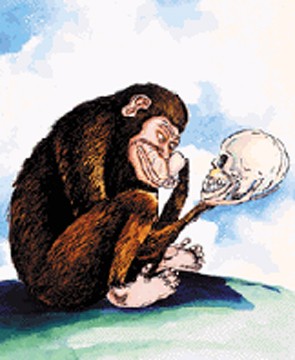
Off the Radar
It’s been a favorite question of armchair philosophers for years. Given an infinite amount of time, would an infinite number of monkeys pounding away on an infinite number of typewriters eventually produce the complete works of Shakespeare?
Because of the laws of chance, mathematicians assure us that the answer is yes. But since rise of the Internet apparently wasn’t enough to prove hundreds of math wizards wrong, Geoff Cox, of Plymouth University’s MediaLab in Britain decided to put the question to rest.
In a project funded by Britain’s Arts Council and intended more as performance art than scientific experiment, faculty and students under Cox’s direction set out to duplicate the hypothesis.
As Malvolio reads in a (slightly altered) passage from Twelfth Night, some apes are born great, some achieve greatness, and some have greatness thrust upon them. Apparently, Elmo, Gum, Heather, Holly, Mistletoe and Rowan fall into the latter category. They weren’t quite sure what to do with the opportunity.
“They got bored, and they shit on the keyboard,” Cox told London’s The Guardian.
The experiment met with complications from the beginning. Since Cox’s 2,000-pound grant could not meet the cost of an infinite number of typewriters, he was forced to settle on a lone computer. However, in switching technology from typewriters to desktops, Cox failed to adjust the time frame on his experiment to account for extra hours of solitaire playing, compulsive e-mail checking, reading other apes’ away messages and searching for primate porn before the monkeys sat began work in earnest.
Similar complications arose in tracking down an infinite amount of monkeys. (Imagine the smell!) Cox culled his search for the next Bard down to six Sulawesi crested macaque monkeys at Devon’s Paignton zoo.
Biologists at the zoo placed the computer into the macaques’ pen and allowed them four weeks to ape the bard. The device was covered in a perspex box with holes for the monkeys to poke their fingers through to hit the keys.
Over the month provided them, the monkeys were able to piece together a five-page opus primarily filled with the letter S. However, there were greater signs of creativity towards the end of the work, once the monkeys discovered the A, J, L and M keys.
“It was a hopeless failure in terms of science, but that’s not really the point,” Cox said. “It wasn’t actually an experiment as such, it was more like a little performance.”
And while it’s no Macaque-beth, “Notes toward the Complete Works of Shakespeare” is available for 25 pounds from www.kahve-house.com/society.shop.
While there were no feats of simian stenography here, Cox believes that though this experiment may appear to be madness, there is method in’t.
“The project was intended to emphasize the differences between animals and machines,” he said. “The monkey’s aren’t reducible to random processes [as the old infinite monkey’s theory suggests.]”
He may be right. The apes, like Shakespeare, work under certain logical processes and experiences that may not be reducible to random number formulas. It’s very unlikely that should the apes learn to type and express coherent thoughts that their work would exactly mimic that of Shakespeare. The biases of their own logical processes would likely have a heavy impact on their work.
In fact, the plots of most of Shakespeare’s plays were adapted from folklore or history; each story seen through the lens of the bard’s own worldview and collected experiences. We could only expect that the complete works of the macaques would follow a similar path.
For instance, Elizabethan dramatic conventions stipulated that tragedies must always end with death. But who’s to say that in the monkey’s version of King Lear (or would it be King Kong?), Edgar would stand idly by as the body count of fellow characters rises. Perhaps Zookeeper Albany would shoot the entire royal family with tranquilizer darts at the first sign of fighting in Act I.
Rather than the verbal sparring of Beatrice and Benedick in Much Ado about Nothing, might their simian counterparts trade launching insults for launching shit as a way of subtle flirting?
And whose to say the titles would even remain the same? Romeo and Bubbles seems a much more likely choice than the antiquated Juliet does. Would that which we call a rose by any other name smell as sweet?
Probably not – especially when it’s been interpreted by apes that are bathed once a week.
Then perhaps the Paignton six should stay away from Shakespeare until their talents are up to it. But in the mean time, Britain’s Arts Council can fund their efforts to replicate the complete works of another equally well regarded yet less challenging master of English rhetoric.
Someone like Dr. Suess. Hop on Pop, anyone?








